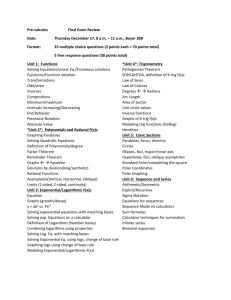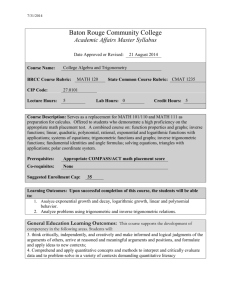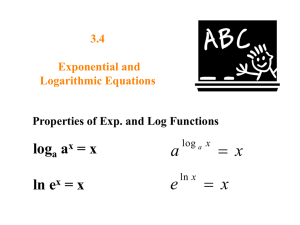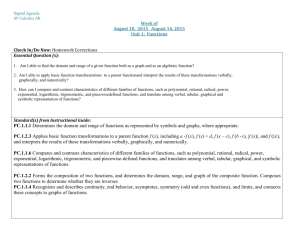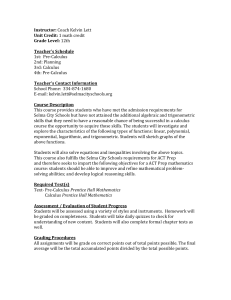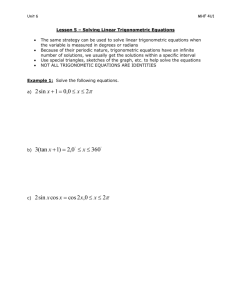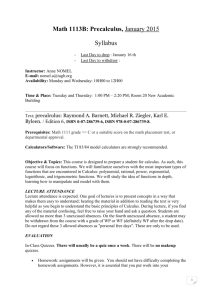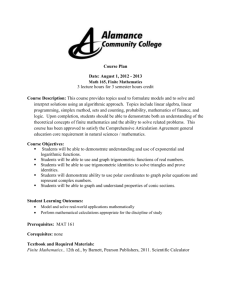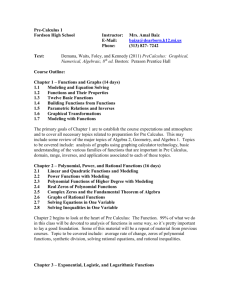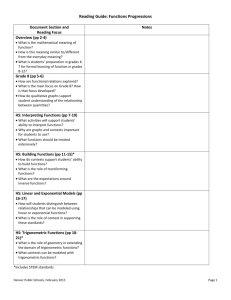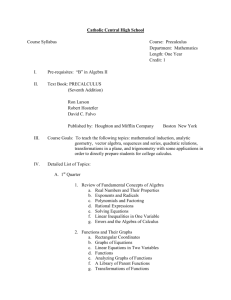MATH 131 - Baton Rouge Community College
advertisement
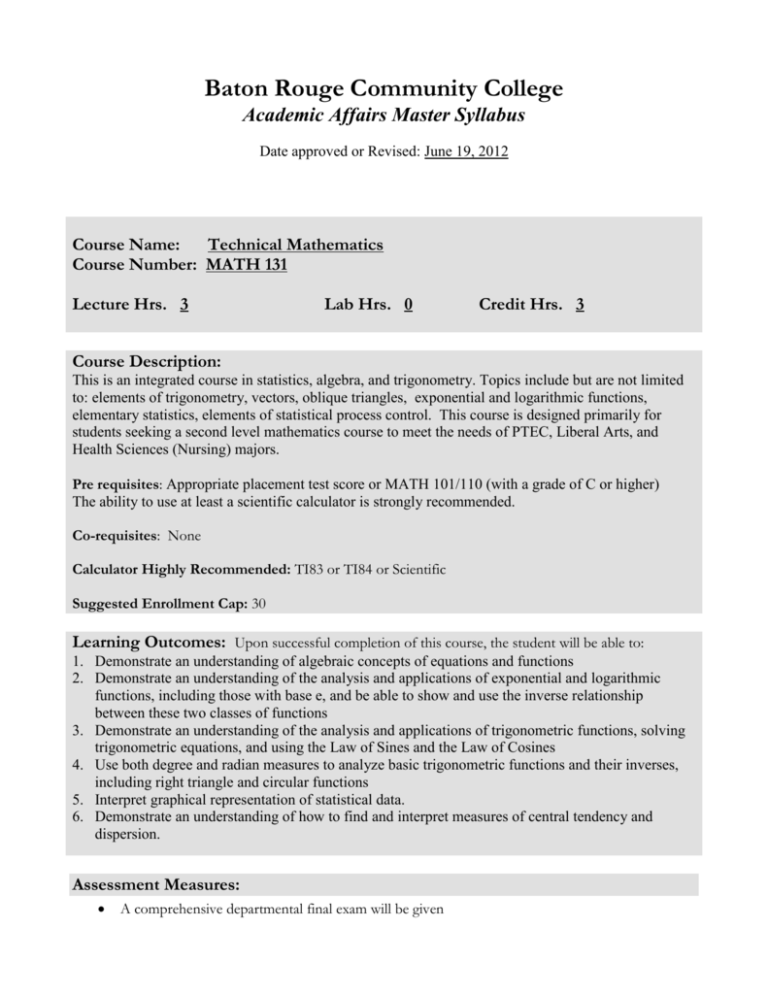
Baton Rouge Community College Academic Affairs Master Syllabus Date approved or Revised: June 19, 2012 Course Name: Technical Mathematics Course Number: MATH 131 Lecture Hrs. 3 Lab Hrs. 0 Credit Hrs. 3 Course Description: This is an integrated course in statistics, algebra, and trigonometry. Topics include but are not limited to: elements of trigonometry, vectors, oblique triangles, exponential and logarithmic functions, elementary statistics, elements of statistical process control. This course is designed primarily for students seeking a second level mathematics course to meet the needs of PTEC, Liberal Arts, and Health Sciences (Nursing) majors. Pre requisites: Appropriate placement test score or MATH 101/110 (with a grade of C or higher) The ability to use at least a scientific calculator is strongly recommended. Co-requisites: None Calculator Highly Recommended: TI83 or TI84 or Scientific Suggested Enrollment Cap: 30 Learning Outcomes: Upon successful completion of this course, the student will be able to: 1. Demonstrate an understanding of algebraic concepts of equations and functions 2. Demonstrate an understanding of the analysis and applications of exponential and logarithmic functions, including those with base e, and be able to show and use the inverse relationship between these two classes of functions 3. Demonstrate an understanding of the analysis and applications of trigonometric functions, solving trigonometric equations, and using the Law of Sines and the Law of Cosines 4. Use both degree and radian measures to analyze basic trigonometric functions and their inverses, including right triangle and circular functions 5. Interpret graphical representation of statistical data. 6. Demonstrate an understanding of how to find and interpret measures of central tendency and dispersion. Assessment Measures: A comprehensive departmental final exam will be given Instructor created exams and/or homework. Information to be included on the Instructors’ Course Syllabi: Disability Statement: Baton Rouge Community College seeks to meet the needs of its students in many ways. See the Office of Disability Services to receive suggestions for disability statements that should be included in each syllabus. Grading: The College grading policy should be included in the course syllabus. Any special practices should also go here. This should include the instructor’s and/or the department’s policy for make-up work. For example in a speech course, “Speeches not given on due date will receive no grade higher than a sixty” or “Make-up work will not be accepted after the last day of class.” Attendance Policy: Include the overall attendance policy of the college. Instructors may want to add additional information in individual syllabi to meet the needs of their courses. General Policies: Instructors’ policy on the use of things such as beepers and cell phones and/or hand held programmable calculators should be covered in this section. Cheating and Plagiarism: This must be included in all syllabi and should include the penalties for incidents in a given class. Students should have a clear idea of what constitutes cheating in a given course. Safety Concerns: In some programs this may be a major issue. For example, “No student will be allowed in the safety lab without safety glasses.” General statements such as, “Items that may be harmful to one’s self or others should not be brought to class.” Library/ Learning Resources: Since the development of the total person is part of our mission, assignments in the library and/or the Learning Resources Center should be included to assist students in enhancing skills and in using resources. Students should be encouraged to use the library for reading enjoyment as part of lifelong learning. Expanded Course Outline: 1. Systems of Linear Equations a. Solving a System of Two Linear Equations b. Determinants c. Properties of Determinants d. Solving a System of Linear Equations Using Determinants 2. Matrices a. Basic Operations b. Multiplication of Matrices c. Finding the Inverse of a Matrix 3. Polynomials of Higher Degree a. Polynomial Functions b. Real Solutions of Polynomial Equations c. Complex Solutions of Polynomial Equations 4. Critical Thinking and Problem Solving a. Uses and Mis-uses of Statistics b. Introduction to Mathematics Modeling 5. Data Analysis a. Basic Raw Materials b. Linear Regression c. Linear Correlation d. Mathematical Modeling of Data 6. Exponential and Logarithmic Functions a. Exponential Functions b. The ”e” Function c. Logarithmic Functions d. Exponential and Logarithmic Equations e. Exponential and Logarithmic Applications 7. Introduction to Trigonometric Functions a. Introduction to Radian Measure b. The Unit Circle and Sin(x) and Cos(x) functions c. The Six Basic Trigonometric Functions d. Graphs of the Six Basic Trigonometric Function 8. Applications of Trigonometry a. Trigonometry of a Right Triangle b. Law of Sines and Cosines c. Vectors in the Plane d. Trigonometric Form of Complex Numbers

